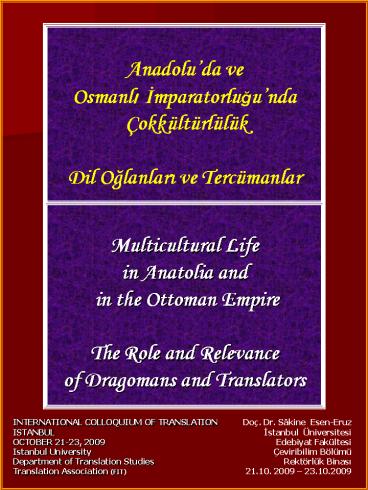Multicultural Life PowerPoint PPT Presentation
1 / 2
Title: Multicultural Life
1
Anadoluda ve
Osmanli Imparatorlugunda
Çokkültürlülük Dil Oglanlari ve Tercümanlar
- Multicultural Life
- in Anatolia and
- in the Ottoman Empire
- The Role and Relevance
- of Dragomans and Translators
Doç. Dr. Sâkine Esen-Eruz
Istanbul Üniversitesi Edebiyat Fakültesi
Çeviribilim Bölümü
Rektörlük Binasi 21.10. 2009 23.10.2009
INTERNATIONAL COLLOQUIUM OF TRANSLATION
ISTANBUL OCTOBER 21-23, 2009 Istanbul
University Department of Translation
Studies Translation Association (FIT)
2
Binlerce yil Anadoludan geçen kervanlar
çokkültürlülügü ticaret yollari boyunca
yanlarinda götürmüslerdir. Çok dillilik
Anadoluya özgü dogal bir durumdur. Çevirmenler
ise bu çok kültürlülügün önemli
temsilcilerindendir. Dört kitaya yayilan
Osmanli Imparatorlugunun saygin üyelerinden
biridir çevirmenler. Bu devasa imparatorlukta ve
Imparatorlugun tükenmez tarihiyle baskent
konumunda bulunan Istanbulda çevirmenler siyasi
ve kültürel yasamin, dahasi ilerlemenin olmazsa
olmaz üyeleridir. Onlar kültür elçileri olarak
Dogu kültürünün Batiya, Bati kültürünün de
Doguya tasinmasini saglarlar. Sergide
M.Ö. 2000lerde olusan Anadolu kültüründen yola
çikarak Osmanli Imparatorlugu'nda çokkültürlülük
ve çevirmenin konumu fotograf ve belgelerle
anlatiliyor.
- For thousands of years the caravans crossing
Anatolia transported the - multiculturalism of the land from one city to the
other. Multilingualism was a - unique aspect of Anatolia where countless
civilisations had lived since 11.500 - B.C.(see Göbeklitepe). The translators and
interpreters, needless to say,were - natural elements of the cultural structure.
- The gigantic Ottoman Empire (1299-1920) -
reaching the peak of its power - between 16th-17th centuries in three continents-
was an Empire of - Translation with her countless tongues. In her
capital the unsurpassable - historic city of Istanbul- the translators and
dragomans were central - characters in trade, politics, education and
culture. Without translators, the - communication in these areas couldnt have been
possible. They transfered the - Eastern culture (Orient) to the West, and the
Western culture (Occident) to - the East.
- In the 19th century, the Ottoman translators were
the leading spirit of the - reform movement.

